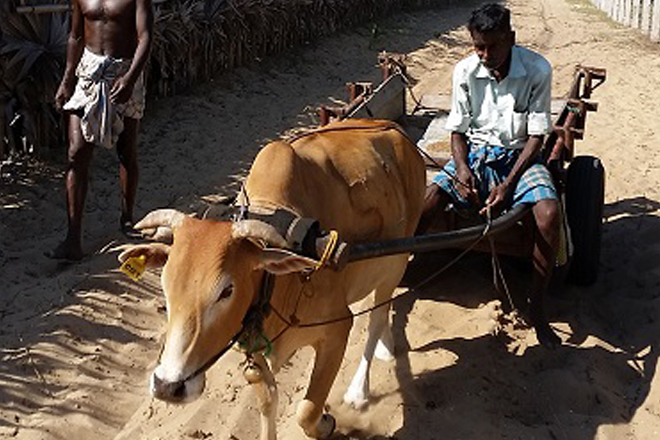By Jekhan Aruliah
We have all made excuses to explain why we didn’t do stuff. I still remember a boy at school attempting the legendary “dog ate my homework” manoeuvre. An excuse so incredible it may have been true. Being unable to prove the excuse to be a lie the class teacher couldn’t punish the boy. However the youth did not escape the scorn of the teacher nor the ridicule of the class. The ridicule the boy suffered was without doubt worse than the penalty for getting caught neglecting to do his homework: a forgettable 30 minutes in detention.
Something that has not been delivered in the eight plus years since the end of the war has been rebuilding the Northern economy. Unlike the above mentioned homework the penalty for this failure to deliver is not paid by those who fail to deliver, but by the people in the North.
This is not about those people who don’t want to invest and don’t. Whether it is investing their time, skills, connections, assets, or whatever, deciding not to contribute is entirely their free choice. This is about those who do want to invest but don’t. This is an attempt to scrutinise one of the common excuses for their failure to deliver.
A reason I have often heard is the North is not yet safe and stable enough to invest in. More than “not safe and stable enough” Jaffna has been described by some as a “hotbed” of crime and extremism. There are those who suggest Jaffna youth, supposedly living idly on foreign remittances, are relieving their boredom with a bit of larceny, assault, battery, and even rebellion plotting!
Being based in Jaffna myself for quite awhile now I find this “hotbed” talk puzzling. From what I have seen myself it’s all rather quiet up North. Of course bad things happen in the North, but compared to Colombo and London where I have also spent much time it seems rather quiet.
I accept that just because I haven’t seen this “hotbed” while living in Jaffna that doesn’t prove it isn’t there out of my sight. Though when I ask people why they believe Jaffna isn’t all that stable, their perceptions are usually not based on what they themselves have experienced. Their opinions are generally constructed on hearsay which itself is based on third party assertions. Opinions based on rumours resulting in stagnation in the North.
For a more evidence based view one should look at the data. Even data collected by reputable organisations may not be of the best quality. But they are probably more reliable than random hearsay and evidence free assertion.
When looking at the data it is important to remember that the Northern Province has the smallest population among Sri Lankan provinces. Of all the districts in Sri Lanka, only Jaffna, Killinochchi and Mannar’s populations fell in the period between 1981 and 2015.
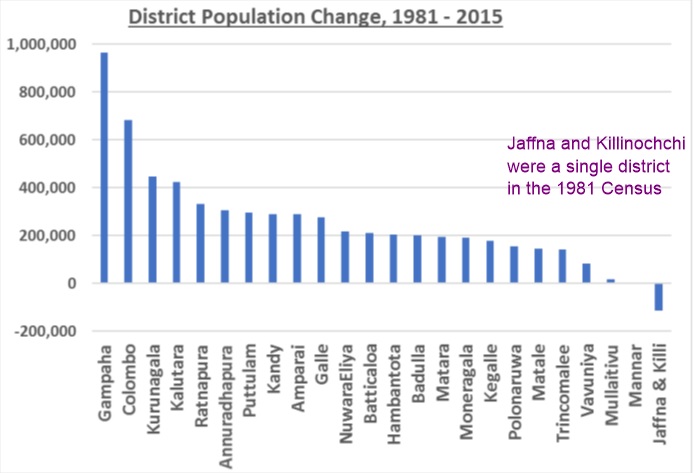
For example, the fact that the National Dangerous Drugs Control’s (NDDCB) figures for “Drug Related Arrests By District” show the Northern Province has the lowest number of arrests could be misleading. Ten badly behaved boys in a school of 100 (10% naughty) is worse than 20 badly behaved boys in a school of 1,000 (2% naughty).
To take the relative populations of the various districts into account, it would be better to give figures per 1,000 people in the district. This shows the rate of arrests in the North is far lower than in the Central, North Western and Western provinces.
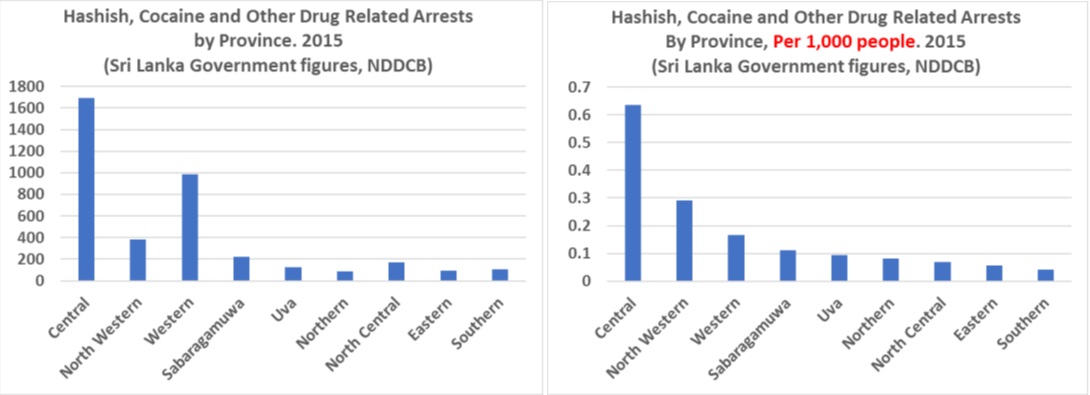
Could it be that although the whole Northern Province’s figures are low, the Jaffna Peninsula itself is a “hotbed” of drug villainy? The same NDDCB report shows this is not the case, comparing Jaffna with Colombo, Trincomalee and Kandy.
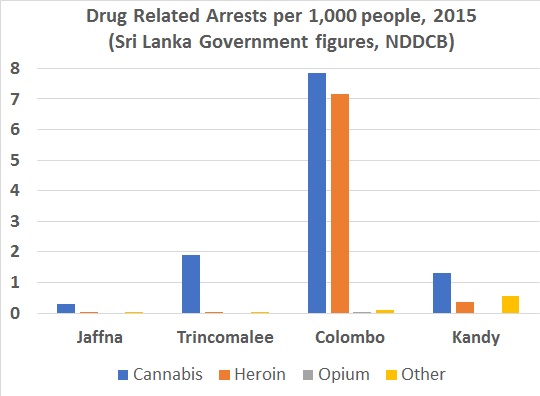
What about Alcohol? Does the North have a bigger drinking problem than anywhere else? A report by the Institute of Policy Studies, “State of the Sri Lankan Alcohol Industry and Analysis of Governing Policies”, provides data suggesting the problem is not bigger. From the report’s selection of large towns, Trincomalee and Colombo have a significantly higher proportion of drinkers.
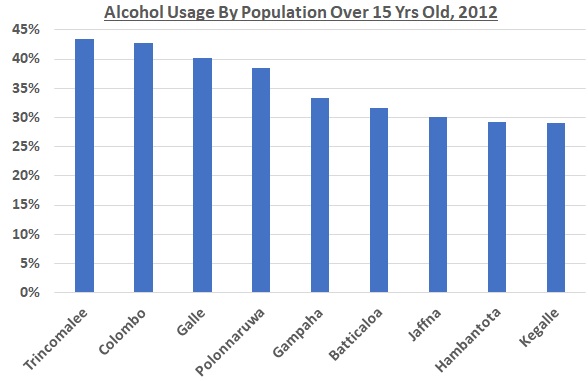
While the proportion of drinkers may not raise alarm bells for Jaffna, what about the quantity they are drinking? The NDDCB’s report “Handbook of Drug Abuse Information 2016” provides figures for quantities of alcohol drunk in different regions. Figures for Beer and Arrack, the common man’s tipples, show Jaffna having relatively low consumption. It could be that in Colombo everyone is meticulously drinking their own 5 litre share of Arrack a year, while in Jaffna one tenth of the population are hell-raisers drinking ten times their share. But where is the evidence for this?
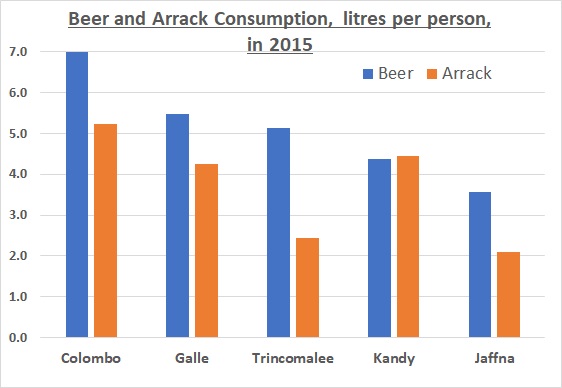
And how about Crime? The district crime figures are published by the Department of Census and Statistics in its District Statistical Handbook. These figures, adjusted to show the rate per 1000 people of reported crime, suggest that you are a lot more likely to be burgled, kidnapped and murdered in Colombo than in Jaffna.
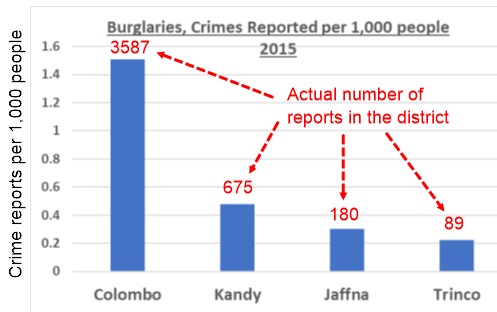
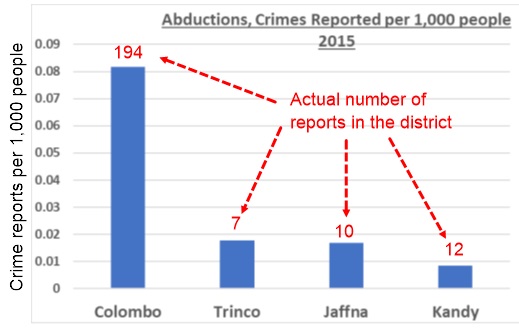
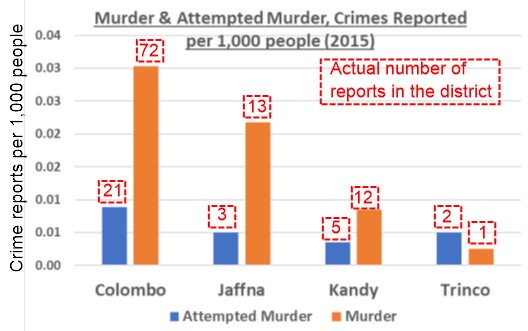
Following two riot-free years in Jaffna, in 2015 you were more likely to see a riot in Jaffna than in Colombo. These included protests in Jaffna related to the brutal rape and murder that year of Vidhya, the young student. While there were more than double the riots reported in Colombo (5 in Jaffna versus 12 in Colombo), the population of Colombo is 4 times larger. Hence the number per thousand in Jaffna is worse.
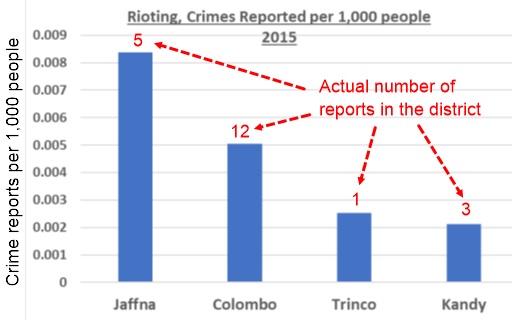
Jaffna, it has to be admitted, is a hotbed of bicycle theft. For which reported crime has soared from 7 in 2013 to 30 in 2014 to 216 in 2015. According to the data there were zero reported bikes pinched in Colombo, Kandy or Trincomalee in 2015.
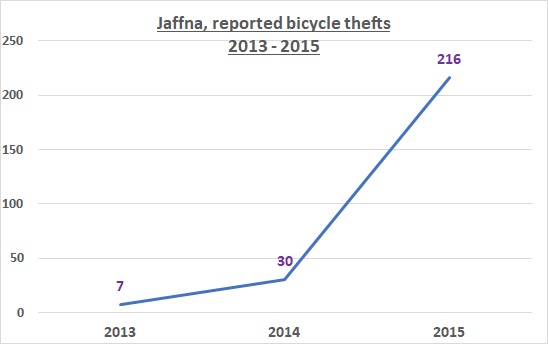
Perhaps in those other places the cops had more important crimes to solve, and turned their noses up at those who had merely lost their bikes. Perhaps the cops in Jaffna had more time for stolen bicycles because, overall, it is a rather quite place. Also perhaps this is an encouraging reflection that the victims are building a more positive relationship with the police, becoming more confident to walk (obviously they couldn’t ride) to the police station to report the crime.
The data suggests that drugs, drunkenness and crime are not generally a greater problem in the North than in the rest of Sri Lanka. This doesn’t mean they are not a problem, and certainly more can be done to address them in terms of prevention, rehabilitation, and helping the victims.
I dare say if I have the misfortune to be mugged one evening in Jaffna my bloody nose will mean more to me than the data, at least until it has dried up. But those who decide not to invest in the North because it is not yet stable or safe enough need to look again.
( — The writer Jekhan Aruliah was born in Sri Lanka and moved with his family to the UK when he was two years of age. Brought up in London, he graduated from Cambridge University in 1986 with a degree in Natural Sciences.
Jekhan then spent over two decades in the IT industry, for half of which he was managing offshore software development for British companies in Colombo and in Gurgaon (India). In 2015 Jekhan decided to move to Jaffna where he is now involved in social and economic projects. He can be contacted at jekhanaruliah@gmail.com — )  For example, the fact that the National Dangerous Drugs Control’s (NDDCB) figures for “Drug Related Arrests By District” show the Northern Province has the lowest number of arrests could be misleading. Ten badly behaved boys in a school of 100 (10% naughty) is worse than 20 badly behaved boys in a school of 1,000 (2% naughty).
To take the relative populations of the various districts into account, it would be better to give figures per 1,000 people in the district. This shows the rate of arrests in the North is far lower than in the Central, North Western and Western provinces.
For example, the fact that the National Dangerous Drugs Control’s (NDDCB) figures for “Drug Related Arrests By District” show the Northern Province has the lowest number of arrests could be misleading. Ten badly behaved boys in a school of 100 (10% naughty) is worse than 20 badly behaved boys in a school of 1,000 (2% naughty).
To take the relative populations of the various districts into account, it would be better to give figures per 1,000 people in the district. This shows the rate of arrests in the North is far lower than in the Central, North Western and Western provinces.
 Could it be that although the whole Northern Province’s figures are low, the Jaffna Peninsula itself is a “hotbed” of drug villainy? The same NDDCB report shows this is not the case, comparing Jaffna with Colombo, Trincomalee and Kandy.
Could it be that although the whole Northern Province’s figures are low, the Jaffna Peninsula itself is a “hotbed” of drug villainy? The same NDDCB report shows this is not the case, comparing Jaffna with Colombo, Trincomalee and Kandy.
 What about Alcohol? Does the North have a bigger drinking problem than anywhere else? A report by the Institute of Policy Studies, “State of the Sri Lankan Alcohol Industry and Analysis of Governing Policies”, provides data suggesting the problem is not bigger. From the report’s selection of large towns, Trincomalee and Colombo have a significantly higher proportion of drinkers.
What about Alcohol? Does the North have a bigger drinking problem than anywhere else? A report by the Institute of Policy Studies, “State of the Sri Lankan Alcohol Industry and Analysis of Governing Policies”, provides data suggesting the problem is not bigger. From the report’s selection of large towns, Trincomalee and Colombo have a significantly higher proportion of drinkers.
 While the proportion of drinkers may not raise alarm bells for Jaffna, what about the quantity they are drinking? The NDDCB’s report “Handbook of Drug Abuse Information 2016” provides figures for quantities of alcohol drunk in different regions. Figures for Beer and Arrack, the common man’s tipples, show Jaffna having relatively low consumption. It could be that in Colombo everyone is meticulously drinking their own 5 litre share of Arrack a year, while in Jaffna one tenth of the population are hell-raisers drinking ten times their share. But where is the evidence for this?
While the proportion of drinkers may not raise alarm bells for Jaffna, what about the quantity they are drinking? The NDDCB’s report “Handbook of Drug Abuse Information 2016” provides figures for quantities of alcohol drunk in different regions. Figures for Beer and Arrack, the common man’s tipples, show Jaffna having relatively low consumption. It could be that in Colombo everyone is meticulously drinking their own 5 litre share of Arrack a year, while in Jaffna one tenth of the population are hell-raisers drinking ten times their share. But where is the evidence for this?
 And how about Crime? The district crime figures are published by the Department of Census and Statistics in its District Statistical Handbook. These figures, adjusted to show the rate per 1000 people of reported crime, suggest that you are a lot more likely to be burgled, kidnapped and murdered in Colombo than in Jaffna.
And how about Crime? The district crime figures are published by the Department of Census and Statistics in its District Statistical Handbook. These figures, adjusted to show the rate per 1000 people of reported crime, suggest that you are a lot more likely to be burgled, kidnapped and murdered in Colombo than in Jaffna.


 Following two riot-free years in Jaffna, in 2015 you were more likely to see a riot in Jaffna than in Colombo. These included protests in Jaffna related to the brutal rape and murder that year of Vidhya, the young student. While there were more than double the riots reported in Colombo (5 in Jaffna versus 12 in Colombo), the population of Colombo is 4 times larger. Hence the number per thousand in Jaffna is worse.
Following two riot-free years in Jaffna, in 2015 you were more likely to see a riot in Jaffna than in Colombo. These included protests in Jaffna related to the brutal rape and murder that year of Vidhya, the young student. While there were more than double the riots reported in Colombo (5 in Jaffna versus 12 in Colombo), the population of Colombo is 4 times larger. Hence the number per thousand in Jaffna is worse.
 Jaffna, it has to be admitted, is a hotbed of bicycle theft. For which reported crime has soared from 7 in 2013 to 30 in 2014 to 216 in 2015. According to the data there were zero reported bikes pinched in Colombo, Kandy or Trincomalee in 2015.
Jaffna, it has to be admitted, is a hotbed of bicycle theft. For which reported crime has soared from 7 in 2013 to 30 in 2014 to 216 in 2015. According to the data there were zero reported bikes pinched in Colombo, Kandy or Trincomalee in 2015.
 Perhaps in those other places the cops had more important crimes to solve, and turned their noses up at those who had merely lost their bikes. Perhaps the cops in Jaffna had more time for stolen bicycles because, overall, it is a rather quite place. Also perhaps this is an encouraging reflection that the victims are building a more positive relationship with the police, becoming more confident to walk (obviously they couldn’t ride) to the police station to report the crime.
The data suggests that drugs, drunkenness and crime are not generally a greater problem in the North than in the rest of Sri Lanka. This doesn’t mean they are not a problem, and certainly more can be done to address them in terms of prevention, rehabilitation, and helping the victims.
I dare say if I have the misfortune to be mugged one evening in Jaffna my bloody nose will mean more to me than the data, at least until it has dried up. But those who decide not to invest in the North because it is not yet stable or safe enough need to look again.
( — The writer Jekhan Aruliah was born in Sri Lanka and moved with his family to the UK when he was two years of age. Brought up in London, he graduated from Cambridge University in 1986 with a degree in Natural Sciences.
Jekhan then spent over two decades in the IT industry, for half of which he was managing offshore software development for British companies in Colombo and in Gurgaon (India). In 2015 Jekhan decided to move to Jaffna where he is now involved in social and economic projects. He can be contacted at jekhanaruliah@gmail.com — )
Perhaps in those other places the cops had more important crimes to solve, and turned their noses up at those who had merely lost their bikes. Perhaps the cops in Jaffna had more time for stolen bicycles because, overall, it is a rather quite place. Also perhaps this is an encouraging reflection that the victims are building a more positive relationship with the police, becoming more confident to walk (obviously they couldn’t ride) to the police station to report the crime.
The data suggests that drugs, drunkenness and crime are not generally a greater problem in the North than in the rest of Sri Lanka. This doesn’t mean they are not a problem, and certainly more can be done to address them in terms of prevention, rehabilitation, and helping the victims.
I dare say if I have the misfortune to be mugged one evening in Jaffna my bloody nose will mean more to me than the data, at least until it has dried up. But those who decide not to invest in the North because it is not yet stable or safe enough need to look again.
( — The writer Jekhan Aruliah was born in Sri Lanka and moved with his family to the UK when he was two years of age. Brought up in London, he graduated from Cambridge University in 1986 with a degree in Natural Sciences.
Jekhan then spent over two decades in the IT industry, for half of which he was managing offshore software development for British companies in Colombo and in Gurgaon (India). In 2015 Jekhan decided to move to Jaffna where he is now involved in social and economic projects. He can be contacted at jekhanaruliah@gmail.com — ) 
